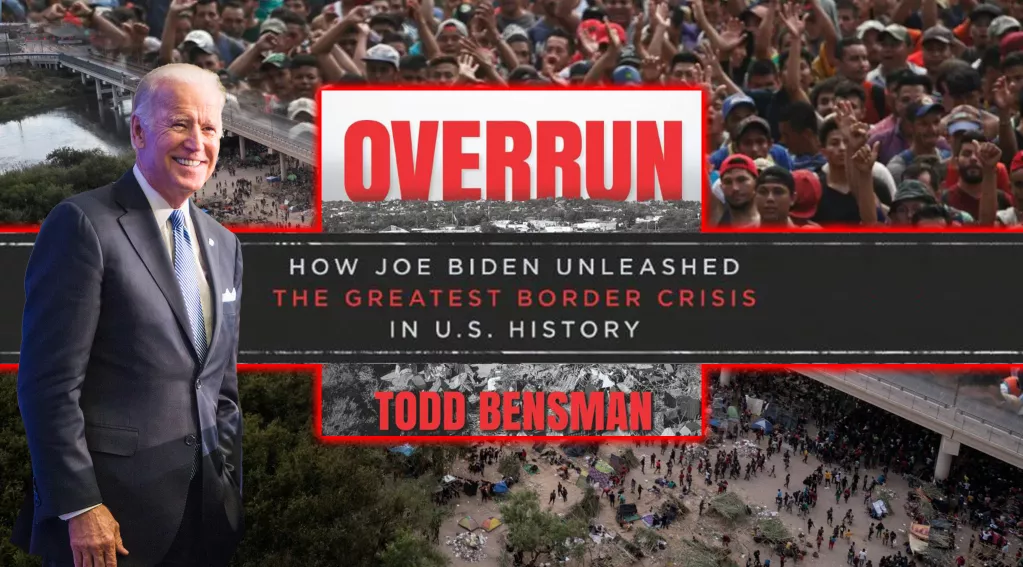Book Review: The Main “Root Cause” of the Border Crisis is Joe Biden’s “Invitation”

In his 2021 book, America’s Covert Border War, the Center for Immigration Studies’ Texas-based Senior National Security Fellow Todd Bensman demonstrated the connection between open, unsecured borders and infiltration by dangerous terrorists. In his latest book, Overrun: How Joe Biden Unleashed the Greatest Border Crisis in U.S. History, Bensman points out the crucial role of the proverbial carrot and stick – i.e., U.S. policies that either encourage or discourage mass illegal migration – in the unprecedented Southwest border crisis.
The book opens with a very important interview that Bensman conducted under the border bridge connecting Ojinaga, Mexico, and Presidio, Texas, with a human smuggler/guide for the notoriously violent La Linea Mexican cartel. When asked about the source of the “enormous economic windfall the [illegal] immigrants were creating for La Linea,” the criminal responded with a simple “la invitación,” which is what the smuggler and his fellow cartel members were calling Joe Biden’s open-border policies. In addition, the coyote, and the people he was smuggling, particularly appreciated Biden’s deportation moratorium.
Overrun successfully illustrates that it was precisely the policy of “the invitation” which led to the ongoing border crisis rather than “root causes,” seasonal fluctuations, or any other alternative explanation offered by the administration and pro-mass-immigration spin masters. Interviews with actual prospective illegal border crossers at the Mexico-Guatemala border affirm numerous reports leading up to the 2020 election in which large groups of migrants sought asylum in Mexico in anticipation of a Biden victory to then sneak into the U.S.
The author proves – with overwhelming evidence based both on interviews and apprehension data – that illegal aliens and human smugglers monitor everything from election promises to court rulings to calculate the odds of successful illegal border crossings. Sometimes, however, the reactions are delayed. A case in point: the Flores Settlement of 1997, which was expanded by a judge in 2015. Originally, the settlement meant that unaccompanied alien children apprehended at the border could not be held for longer than 20 days, after which they must be released. The 2015 ruling extended the rule to include family members. The Flores loophole became well-known in 2018 following the backlash against the Trump administration’s “zero tolerance” policy.
However, the previous administration responded and significantly reduced illegal migration by doubling-down on border security and cracking down on asylum abuse. Unlike the Biden administration, which has largely abandoned any form of deterrence. The reason is that the Biden administration has been taken over by open-borders “abolish ICE” radicals. Bensman reveals that more pragmatic elements within the White House – motivated primarily by fears of the bad optics of the Biden Border Crisis – attempted to push back, and even managed to extract some concessions (e.g., flying back some Haitian border-crossers, requiring some Latin American countries to require transit visas). But, ultimately, the extremists prevailed and temporary reversions towards deterrence were rendered meaningless by the overall climate of “la invitación.”
Of course, a short review cannot possibly do justice to the multiple topics discussed in the book, although all of these are interrelated and help us better understand the illegal immigration crisis. A few important issues elaborated upon by Bensman are mass asylum fraud (and the policies that encourage it); the desire to build large, fancy houses in the Mayan highlands of Guatemala as a major driver of illegal migration; and the major burden posed by mass unlawful influxes on public schools.
For anyone seeking to understand the causes and scale of the Southwest border illegal immigration crisis – as well as the key solutions – Overrun is the definitive book. Almost 400 pages long, with over 500 endnotes, it is not a quick read, but it is most certainly worth the effort. In fact, the author’s travels and daring reporting from Latin America and the border zone make for very interesting reading, giving this profoundly informative book a page-turning action-and-adventure twist.

